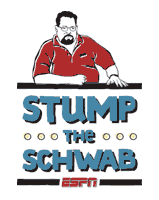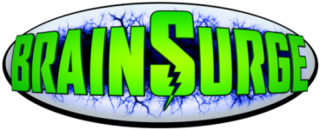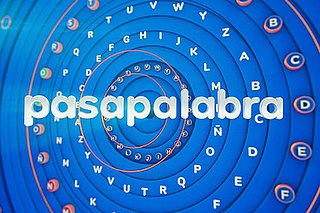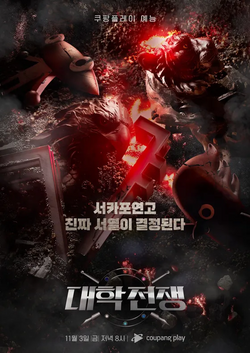
SmartAsk is a Canadian quiz show which ran for three seasons on CBC Television. The show was taped in front of a live audience, with the players sitting on a tiered set. The SmartAsk tournament was described by Ralph Benmergui, the show's executive producer, on TSN's Off The Record as being "Reach for the Top on acid," although in practice this largely involved crude humour, especially as the show went on and ratings sagged.

Chain Reaction is an American television game show created by Bob Stewart, in which players compete to form chains composed of two-word phrases.
Idiot Savants is an American television game show on the MTV network which ran from December 9, 1996, to April 25, 1997. It was created by Michael Dugan and Chris Kreski, directed by Steve Paley, and hosted by comedian Greg Fitzsimmons.

Get the Picture is a children's game show that aired from March 18 to December 6, 1991, with repeats until March 13, 1993 on Nickelodeon. Hosted by Mike O'Malley, the show featured two teams answering questions and playing games for the opportunity to guess a hidden picture on a giant screen made up of 16 smaller screens. The show was recorded at Nickelodeon Studios in Universal Studios, Orlando, Florida. The program's theme music and game music was composed by Dan Vitco and Mark Schultz, and produced by Schultz. Its tagline is The Great Frame Game.

Stump the Schwab is an American game show that aired on ESPN2 and ESPN Classic from July 8, 2004 to September 29, 2006. The show featured three contestants trying to defeat Howie Schwab, ESPN's first statistician, in a sports trivia contest. Stuart Scott was the show's host. The show also appeared on Canada's The Score Television Network.
itbox is a networked gambling games terminal which is found in thousands of pubs, leisure centres and amusement arcades in the United Kingdom. Classified as a "skill with prize" (SWP) machine, each itbox terminal typically includes 25 different games. Each game costs 50p or £1 to play and lasts between 10 seconds and several minutes. From most of these games it is possible to win modest cash prizes. Although strictly the name 'itbox' refers only to Leisure Link-made terminals, the name is often casually applied as a genericized trademark to other SWP terminals such as Paragon SWP, Gamesnet, ind:e and Fatbox.

Game Ka Na Ba?, formerly Million-Million Na! Game Ka Na Ba?, Next Level Na! Game Ka Na Ba?, and Pilipinas Game Ka Na Ba is a Philippine television game show broadcast by ABS-CBN and Jeepney TV. Originally hosted by Kris Aquino, it aired on ABS-CBN's Primetime Bida line up from October 8, 2001 to February 27, 2004, and was replaced by Star Circle Quest. The show moved to the Bigtime Trio line up from November 15, 2004 to October 23, 2009, and was replaced by Showtime. The show was revived to Jeepney TV from October 12, 2020 to November 19, 2021 and on Kumu from February 19 to June 18, 2022. Robi Domingo serve as the final hosts.
It's Academic is an Australian children's game show which is based on the long-running American version of It's Academic, and pits students from different schools against each other in a test of knowledge covering a number of diverse subjects including English, mathematics, science, geography, sport, music and popular culture.

Miljoenenjacht, officially Postcode Loterij Miljoenenjacht, is a Dutch game show, sponsored by the country's postcode lottery, where a contestant and at-home viewer could win up to €5,000,000 or as little as €0.01. The show is broadcast at various times, spanning across six episodes for each set. The program was originally shown by TROS on NPO 2, but moved to creator John de Mol's channel Tien in 2005. After the channel was discontinued after its sale to the RTL Group, the program moved to RTL 4. In 2019, the program moved to SBS6 due to the transfer of Linda de Mol from RTL to SBS.
On the Spot is an American game show produced by and broadcast on KGW-TV in Portland, Oregon as a daily series from September 1984 to October 1988. Newscaster Larry Blackmar was host, while local disc-jockey Michael Bailey announced.

BrainSurge is an American children's game show that aired on Nickelodeon and was hosted by Jeff Sutphen. The show taped its first season in February 2009, and debuted on September 28, 2009. The show's format was adapted from the Japanese game show Brain Survivor. The U.S. version was created by Scott A. Stone, co-creator of Legends of the Hidden Temple, and Clay Newbill, executive producer of The Mole.
Family Game Night is an American television game show based on Hasbro's family of board games and EA's video game franchise of the same name. The show was hosted by Todd Newton. Burton Richardson was the announcer for the first two seasons; he was replaced by Stacey J. Aswad in the third season, and Andrew Kishino was hired for the fourth season. The 60-minute program debuted on October 10, 2010, on The Hub ; it was previewed on October 9, 2010, on its sister channel, TLC. Seasons 1 and 2 contained 26 and 30 episodes respectively. Seasons 3, 4 and 5 each contained 15 episodes. Season 2 premiered on Friday, September 2, 2011, with additional games being added. The games added to the second season included Cranium Brain Breaks, Green Scream, Ratuki Go-Round, Simon Flash, Operation Sam Dunk, Trouble Pop Quiz, and Spelling Bee. However games from the previous season were still kept.
Time Shock, is a game show airing in Japan. Its original run, titled Quiz Time Shock, was broadcast between 1969 and 1986, airing for 888 episodes; another series aired from 1989 to 1990, which was canceled after just 22 episodes. A second revival, Time Shock 21, broadcast 65 episodes between 2000 and 2002. Afterwards, a series of periodic specials titled Time Shock aired from 2002 through 2007, plus one in 2007 titled New Time Shock. The most recent revival was a series of specials titled Super Time Shock; 18 specials were broadcast from March 27, 2008 to December 26, 2012.

Sell Me The Answer is a game show that aired on Sky 1 from 9 November 2009 to 29 January 2010 and is hosted by Gethin Jones.

Pasapalabra is a Spanish television game show, adapted from the British format The Alphabet Game. The title is a portmanteau of the Spanish verb pasar, "pass", and palabra, literally "word".
Hive Minds is a British television quiz show that aired on BBC Four from 14 July 2015 to 1 December 2016. It was hosted by Fiona Bruce.
Gefragt – Gejagt (Asked—Chased) is a quiz show that has been broadcast on German television since 2012. It is the German adaptation of ITV's show The Chase.

Master Minds is an American game show airing on the Game Show Network. The show debuted on June 10, 2019, under the title Best Ever Trivia Show, hosted by Sherri Shepherd and regularly featuring Ken Jennings, Muffy Marracco, Jonathan Corbblah, Arianna Haut, and Ryan Chaffee. The series was renamed Master Minds on April 6, 2020, with Brooke Burns replacing Shepherd.

2 voor 12, formerly Twee voor Twaalf, is a Dutch game show broadcast weekly on that country's public television system since 1971 by BNNVARA. Joop Koopman hosted the original version of the program, which aired from 1971 to 1981. A revival, hosted by Astrid Joosten, has aired since 1991, and is broadcast on NPO 2 as of 2021. The program was the longest-running quiz program on Dutch television as of 2013.

University War also known as Elite League is a South Korean reality game show where students from prestigious universities in South Korea and abroad battle to solve brain quizzes. The first season premiered on November 3, 2023 on Coupang Play. The second season is scheduled to air in the second half of 2024.











